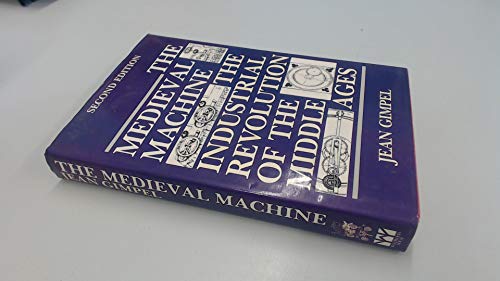
Synopsis
The common, simplistic view of the Middle Ages as religion-centered and materially backward is challenged by Jean Gimpel in this milestone study, originally published in 1976. The Medieval Machine tells how, between the years 900 and 1300, Europeans created their first industrial revolution, which set Western civilization on the road to global dominance. Gimpel describes the main features of this early machine the pervasive use of waterpower (the oil of the medieval era); the agricultural innovations that energized the population through better nourishment; the spread of mining along with mechanized iron mills; and the appearance of modern industrial problems such as labor unrest and pollution. This is a story of technology architect-engineers were adulated; there were tallest-building contests like those of the twentieth century. The climax comes with the invention of the key modern device-the mechanical clock. The subsequent technological decline, Gimpel explains, was due to plague, famine, and a reversion to mysticism.In the epilogue, Gimpel asserts that the West in his time faced another technological decline; he did not foresee the digital boom of the 1980s and 90s and the development of a post-industrial economies. Nevertheless, his predictions may provide valuable material for historians of the recent past.
"synopsis" may belong to another edition of this title.
Review
The Middle Ages, writes French scholar Jean Gimpel, saw an extraordinary flourishing of technological development throughout Europe. With the era came waterwheels and clock towers, nearly uniform machine parts and improvements in public hygiene, vaulting cathedrals and towering city walls, and a notion of spiritual and earthly progress that promised better things to come. In analyzing the growth of precision in measurement and of the experimental sciences, and in considering the careers of medieval geniuses such as the architect-inventor Villard de Honnecourt, Gimpel clearly conveys the intellectual excitement of the time. Sadly, it was undone by religious intolerance, brutal warfare, and the arrival of the plague as quickly as it rose.
"About this title" may belong to another edition of this title.
Other Popular Editions of the Same Title
Search results for The medieval machine: The industrial revolution of...
The Medieval Machine: Industrial Revolution of the Middle Ages
Seller: WorldofBooks, Goring-By-Sea, WS, United Kingdom
Hardback. Condition: Fair. A readable copy of the book which may include some defects such as highlighting and notes. Cover and pages may be creased and show discolouration. Seller Inventory # GOR007590386
Buy Used
Quantity: 1 available
The Medieval Machine: Industrial Revolution of the Middle Ages
Seller: WorldofBooks, Goring-By-Sea, WS, United Kingdom
Hardback. Condition: Very Good. The book has been read, but is in excellent condition. Pages are intact and not marred by notes or highlighting. The spine remains undamaged. Seller Inventory # GOR003915745
Buy Used
Quantity: 1 available
The Medieval Machine
Seller: Hamelyn, Madrid, M, Spain
Condition: Aceptable. : El libro 'La máquina medieval' de Jean Gimpel desafía la visión simplista de la Edad Media como un período centrado en la religión y materialmente atrasado. Gimpel muestra cómo, entre los años 900 y 1300, los europeos crearon su primera revolución industrial, que encaminó a la civilización occidental hacia el dominio global. Describe las principales características de esta temprana máquina: el uso generalizado de la energía hidráulica, las innovaciones agrícolas que dinamizaron a la población a través de una mejor alimentación, la expansión de la minería junto con los molinos de hierro mecanizados y la aparición de problemas industriales modernos como los disturbios laborales y la contaminación. El libro también aborda el declive tecnológico posterior debido a la peste, el hambre y una reversión al misticismo. EAN: 9780704530980 Tipo: Libros Categoría: Historia|Negocios y Economía Título: The Medieval Machine Autor: Jean Gimpel Editorial: Wildwood House Idioma: en Páginas: 294 Formato: tapa dura. Seller Inventory # Happ-2025-09-04-9cbf546e
The Medieval Machine: Industrial Revolution of the Middle Ages
Seller: Jenhams Books, Dundee, United Kingdom
hardcover. Condition: Good. A hardback volume in Good to Very Good condition, slight tanning to page margins, in a Very Good dustjacket. Quite scarce. This book is in stock now, in our UK premises. Photos of our books are available on request (dustjacket and cover illustrations vary, and unless the image accompanying the listing is marked 'Bookseller Image', it is an Abebooks Stock Image, NOT our own). BUYERS OUTSIDE UK please also note the following: 1. shipping rates apply to packets of 750g and under, and should the packed weight of an item exceed this we reserve the right to ship via 'Economy', or request extra postage prior to fulfilling the order, or cancel 2. many countries apply import or other taxes - these are the buyers responsibility; we may ask for extra payment to cover any taxes which we have to pay 'up front' on the buyer's behalf. Seller Inventory # mon0000150978
Buy Used
Quantity: 1 available
The medieval machine: The industrial revolution of the Middle Ages
Seller: Mispah books, Redhill, SURRE, United Kingdom
hardcover. Condition: Acceptable. Dust Jacket NOT present. CD WILL BE MISSING. SHIPS FROM MULTIPLE LOCATIONS. book. Seller Inventory # ERICA82907045309883
Buy Used
Quantity: 1 available

